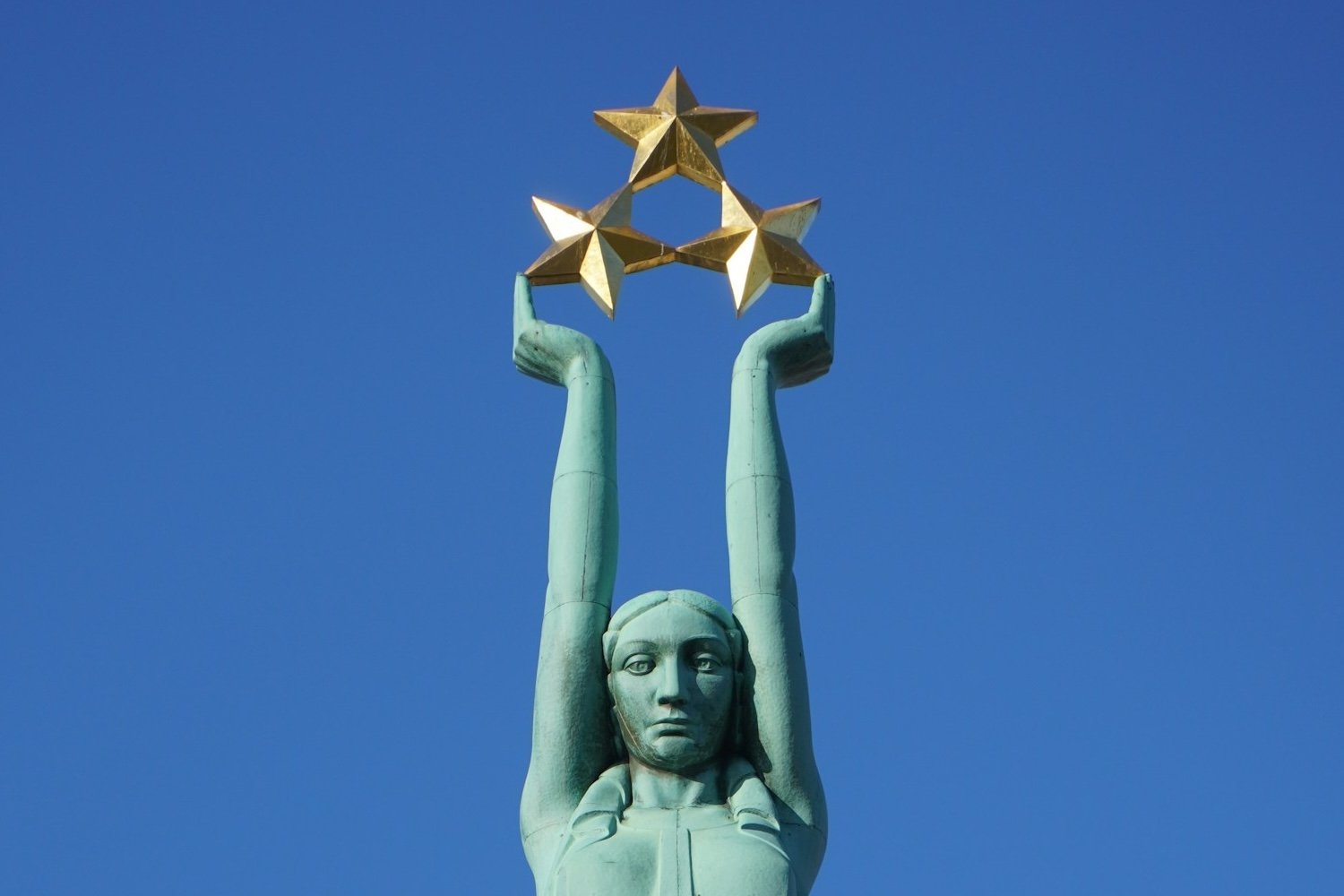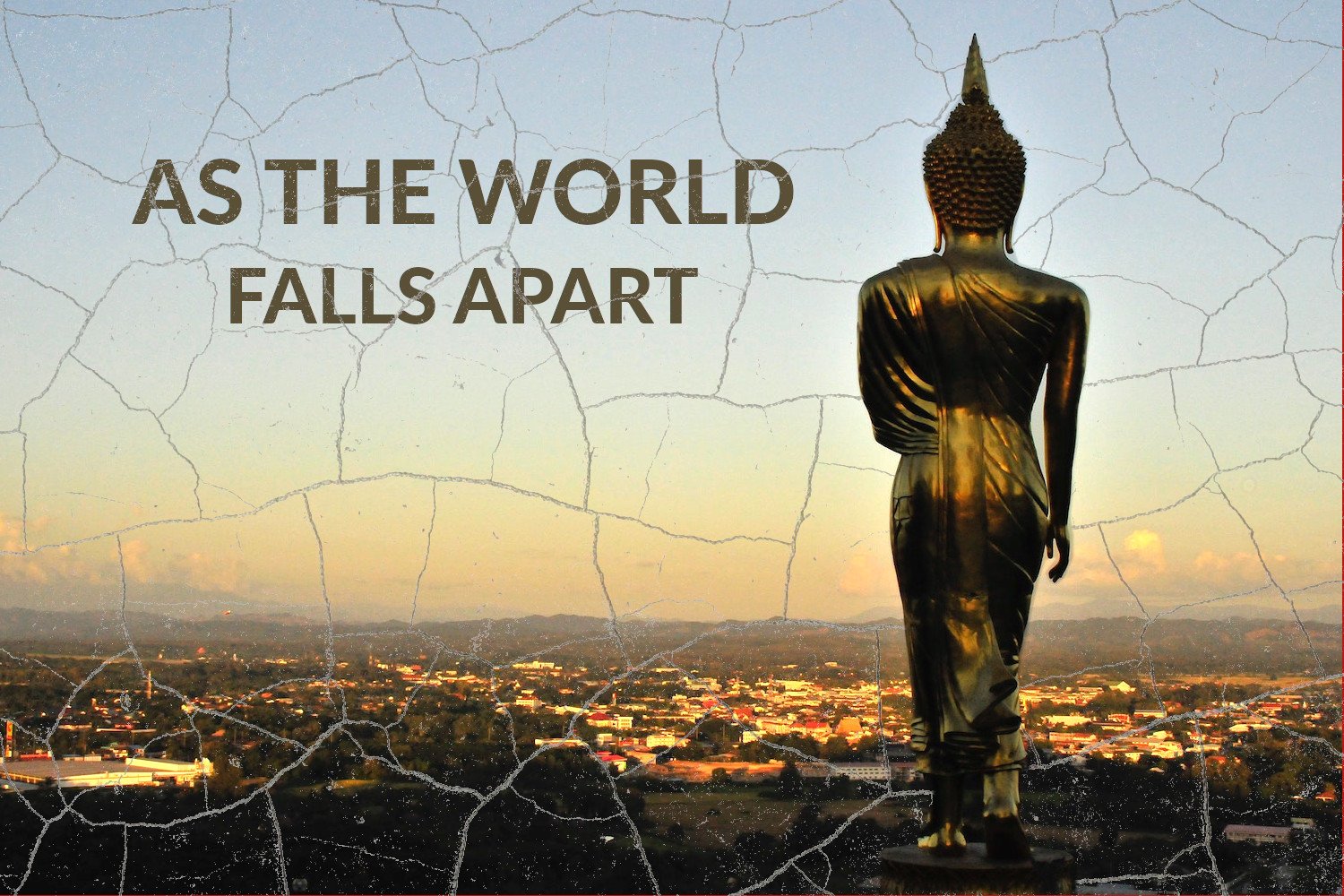Because of the alarming political situation in the US, which has parallels with events in other countries, I’ve been writing about how we, as spiritual practitioners, might skillfully face the troubling emotions politics can give rise to.
The two emotions that stand out for me are fear (where is this all going? how bad will things get?) and despair (mourning the loss of democratic norms).
To help me to deal with these potent emotions, I’ve adopted three slogans: Feet on the ground. Heart wide open. Eyes upward (or keep looking up). These provide a framework for my practice.
- Feet on the ground means finding ways to keep ourselves emotionally balanced, so we can avoid panic and despair. We might want to be mindful in our news consumption. We might choose not to follow those who build followings on social media by generating, outrage, and follow instead people who are informed, compassionate, and balanced. Keeping up a daily meditation practice helps us be calmer. Keeping up our friendships (especially with those who are wise and balanced) helps us with emotional regulation. We might also understand that what’s happening today is part of a long historical pattern of swings between more democratic and autocratic styles of government.
- Heart wide open reminds me that it’s important not to shut down and disengage, no matter how overwhelming the news might be. We need to create an inner space of compassion — staying in touch with our own suffering — and live from that space. We need to stay in touch with the reality of others’ suffering, and do what we can to help.
- Eyes upward reminds me that we mustn’t ever let what’s happening now seem acceptable. We must remember, at a time of viciousness and chaos, what’s good and normal, and how things should be. But a return to normal, difficult as it is to imagine the path that takes us there, wouldn’t be enough. “Eyes upward” means aspiring to create a better, fairer society than we had before. Above all, it means developing a deeper appreciation of democracy and wanting a better, more inclusive, less corrupt democracy.
Democracy Is Under Threat
In fact, one of the things we are losing, or might be losing — and this is a source both of grief and fear — is democracy itself. The grief comes because of the freedoms and security we have lost. The fear comes for many reasons, but chief amongst them is that when leaders are no longer subject to democratic accountability, very bad things start to happen, from political persecution up to torture, murder, and genocide.
Democracy goes through periods of expansion and contraction. There were very few democracies before World War I, but an explosion of them afterwards. Democracies in that period also became more truly democratic, extending the franchise to working class men and to women.
Before WWII there was rise of authoritarianism and a decline in democracy. But after that war, the former colonies shed their European overlords, former dictatorships became democracies, and democracy expanded again. With the collapse of the Soviet Union, many former communist dictatorships adopted democratic forms of government. The number of people living in democracies peaked around 2006, after which democracy there was a rise once again of authoritarianism. Sometimes this authoritarianism took the guise of “illiberal democracy” where elections take place, but the ruling party has rigged things so that they’re almost certain to stay in power. Orbán’s Hungary is a prime example of this.
Right now we’re seeing a stark decline in democracy in the United States. Danger signs include:
- the president taking control of governmental spending (a function reserved for congress)
- threats to media outlets and law firms that the president regards as enemies
- threats against judges (and actual arrests)
- the executive branch defying court orders
- the government attempting to take over the running of universities, etc.
These are all classic moves in establishing a Hungary-type authoritarian pseudo-democracy.
Recognizing the long-term ups and downs of democracy reminds us that it’s not “game over” when a country becomes authoritarian or even an outright dictatorship. Authoritarian regimes tend to implode, and people’s hunger for freedom and self-determination can never be entirely suppressed.
Reasons to Have Faith In Democracy
I have faith in democracy as the best form of government for complex modern states. It is our best hope for a dignified human existence. And it is the best political system for facilitating spiritual practice.
I say this knowing that there is no such thing as a perfect democracy. Human beings are themselves not perfect, and we are emerging from a history soaked in blood. We cannot slough off the past, and have to learn from it, sometimes painfully, in order to move on.
I offer four grounds to support my claim that liberal democracy is the best form of government.
1. Liberal Democracies Are More Peaceful
It is exceedingly rare for democracies to go to war with each other. The establishment of democracy in virtually all of Europe and South America has drastically reduced the incidence of war in those areas of the world. The more democracies there are, the more peaceful the world is likely to become.
Autocracies are inevitably violent. Their leaders are themselves belligerent and intolerant. They see wars as a good way of distracting a population from the poor standard of living that results from their inept leadership. Their populations are often unable to protest against wars. This is the case in Russia, for example. People may be so misled by propaganda that they don’t understand what’s going on. Many people in Russia think their soldiers are fighting Nazis in Ukraine. The more freedom there is, and the more the media is able to report what’s going on, the more opposition there is to war.
When autocratic leaders don’t direct violence against other countries, they often do so against less-favored citizens of their own countries. Liberal democracies tend to be peaceful places to live. Citizens do not generally have to fear that they will be dragged off for holding dissenting views. As Orwell wrote, “No system except democracy can be trusted to save us from unspeakable horrors.”
2. Liberal Democracy Allows for Material Flourishing
Liberal democracies tend to provide a far higher standard of living than autocratic regimes. The 10 countries with the highest standard of living are all liberal democracies, and yet liberal democracies count for only a third of the world’s governments.
Liberal democracies tend to be stable, predictable, and durable. No democracy is perfect, but in the main they have strong political institutions and legal systems, and democracies usually choose people with demonstrated competence to staff its agencies. Authoritarian regimes, offer government posts as rewards to those who demonstrate loyalty to the leader. Corruption flourishes, and as a result, the country and its economy become inefficient. The more dysfunctional and corrupt a democracy is, the more likely it is that it’s in the process of becoming authoritarian.
The more flawed a democracy is, the worse the standard of living tends to me. Neither the UK and US is anywhere near the top of the standard of living chart (the US is 15th, while the UK is 22nd), and both countries have been downgraded by the Economist Intelligence Unit from “full” to “flawed” democracies.
3. Liberal Democracy Allows for Emotional and Spiritual Flourishing
There is a reason why so many great spiritual and philosophical teachers—including the Buddha, Confucius, Socrates, and Plato—arose in the so-called Axial Age. The invention of iron meant that society was no longer living at a subsistence level. People could use iron axes to clear forests for agriculture use, and plow fields with iron-tipped plows. The agricultural surplus they generated, they could transport long distances in carts with iron-rimmed wheels. This created cities, where minds could more easily meet and talk.
With a higher standard of living, and with more free time, people could now ask questions like, “What is my life’s purpose? What does it mean to live a good life?” To focus here on material flourishing is not to be materialistic. It’s to recognize that freedom from material want allows for spiritual flourishing.
Many of the qualities necessary in the political culture of a democracy — a democracy’s “personality,” so to speak — are skillful traits of trust, ethics, and empathy. These qualities give rise to well-being in those that bear them and open them up to spiritual growth.
By contrast, authoritarian regimes produce unhappy people. Authoritarian governments engender feelings of powerlessness and cynicism. People may believe a regime’s propaganda for a while, but eventually they realize that they are surrounded by lies. Everyone is corrupt, and nothing is done well, but changing things is almost impossible.
Authoritarian regimes have to distract their populations from their problems. One way to do this is to generate hatred. Leaders will often target a despised group that they blame for society’s problems. In this way, authoritarianism encourages unskillful emotions of hatred and intolerance. For the same reason it encourages simplistic black and white thinking, rather than more nuanced thinking that encourages truth-seeking.
4. Liberal Democracies are Tolerant of Spiritual Exploration
One of the “personality traits” of democracies being their tolerance of diversity, democracies tend to allow for spiritual experimentation. Mature democracies officially recognize, minority religions such as Buddhism, and often give them access to special benefits, such as tax-exemptions. Although in some ways the US is a religiously intolerant nation, people who are Buddhists or members of other minority languages have been elected to high office.
The American experiment took as axiomatic the idea that people should be free to follow their own conscience in seeking a life that’s meaningful. For that reason, the founders of the US avoided having a state religion. In contrast, autocratic nations often have a favored state religion, and minority religions may be disadvantaged, discriminated against, or even persecuted.
Because of these positive conditions, Buddhist sanghas tend to flourish in democratic nations.
So for these four reasons — democracies being more peaceful, prosperous, emotionally skillful, and supportive of spiritual exploration — I describe democracy as the most desirable form of political organization.
We Are the Majority
As democratic norms are eroded, we need to avoid panic (feet on the ground), yet we need to care deeply (heart wide open) and channel our love anger into opposing harmful changes. And as we do these things we need to keep reminding ourselves and others of democratic ideals, and of the material, emotional, and spiritual benefits of democracy (eyes upward). We need to keep democracy in people’s minds and on people’s tongues, and resist their tendency to see what’s happening as inevitable and unstoppable.
It’s the desire for freedom that’s unstoppable. Yes, sometimes people take democracy for granted. Sometimes they’ll vote for authoritarian leaders because they’re struggling economically or afraid of demographic change. And for some people the cruelty is the point.
But as I’ve written before, “[it’s] important to remember that there are many people in the US (and elsewhere, of course) who believe in kindness, generosity, tolerance, compassion, democracy, standing up to autocrats, and protecting the world that sustains us. That’s much more than half of the population. We are the majority.
We are the majority. And we will prevail.

Wildmind is a Community-Supported Meditation Initiative. Click here to find out about the many benefits of being a sponsor.
Publisher: Source link






